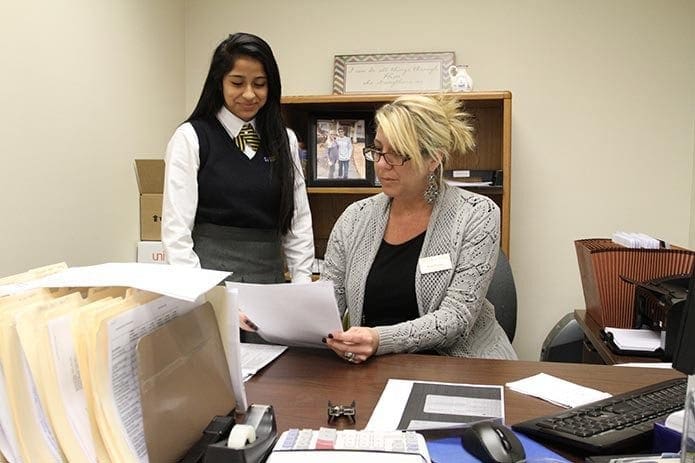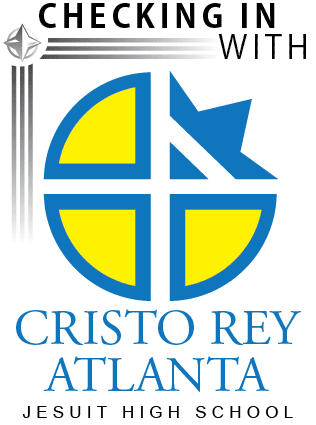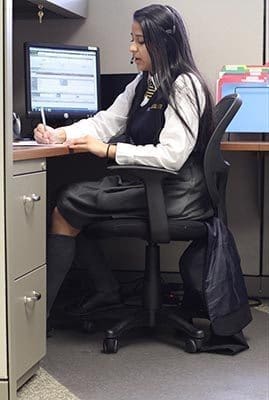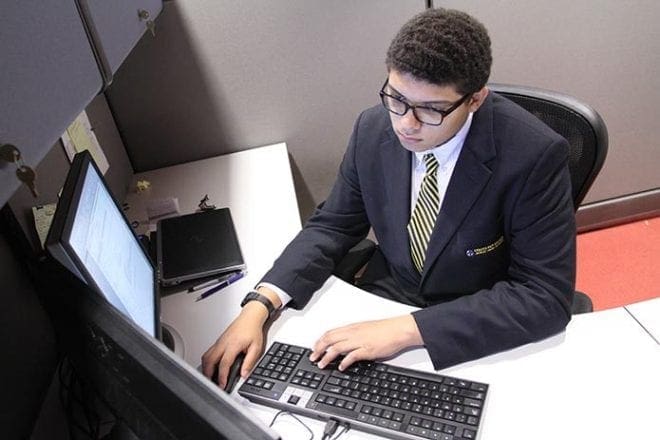 Photo By Michael Alexander
Photo By Michael AlexanderAtlanta
Reporting to jobs one day a week is part of freshman year at Cristo Rey Atlanta
By ANDREW NELSON and NICHOLE GOLDEN, Staff Writers | Published February 5, 2015
Cristo Rey Atlanta Jesuit High School opened its doors in August 2014 with some 160 students in its inaugural freshman class. The West Peachtree Street school offers a college prep curriculum for students from financially strapped families. What is unique is how it does this: one day a week, on a rotating schedule, students are at work in Atlanta businesses earning money to subsidize their education. This second in a three-part series by The Georgia Bulletin looks at the unique Cristo Rey Work Study Program and the employers who have welcomed students to work in their offices and are part of the team investing in their academic and lifelong success.
 ATLANTA—Three Cristo Rey students worked to straighten a banner reading “Welcome and Good Luck Class of 2018.” Blue and gold star-shaped balloons decorated the room.
ATLANTA—Three Cristo Rey students worked to straighten a banner reading “Welcome and Good Luck Class of 2018.” Blue and gold star-shaped balloons decorated the room.
The excitement rivaled that surrounding professional athletes on draft day. As the boys and girls filed in, thunderous applause from teachers, supporters and business leaders greeted the students.
A Cristo Rey staffer read names of students and the company who had “drafted” them, announcing where these teens, many for the first time, would be introduced to an office culture. Smiling students posed with company leaders for snapshots, tried on caps emblazoned with company logos and peeked into gift bags they’d been given.
Father James Van Dyke, school principal, encouraged the students.
“You go out and give them hope. Do a great job. Do great things,” he said.
Businesses buy into unique school model
That was last August, as the ninth-grade class of 154 Cristo Rey students joined executives from the Atlanta business community to be drafted in teams of four to work at entry-level jobs. The students’ earnings cover the majority of their tuition at the independent Jesuit Catholic school.
Companies included Atlanta corporate giants like Coca-Cola Co., Cox Communications, Delta Air Lines, Home Depot and UPS. Some 41 law offices, public relations firms, and medical practices signed up to have fresh-faced teenagers among their workforce. Through the Cristo Rey Corporate Work-Study Program, students carry a full load of classes and also work five days a month, from 8:30 a.m. to 3:30 p.m. It is a key component in making the college-prep education affordable for lower-income students, a national model new to Atlanta in 2014.
Tracy Russell-Gonzalez, director of guest and volunteer services at Emory Health Care, attended the draft day. She thinks companies can only benefit from hosting the work-study programs and its students.
“They bring their energy, their enthusiasm, their newness,” said Russell-Gonzalez.
She knows many young people consider careers as medical doctors, but internships in health care settings teach youth about what else is available in the industry.
“There are so many other disciplines,” she said.
Deacon Bill Garrett, Cristo Rey Atlanta president, lobbies companies to give the program a chance. People know about the educational struggles in Atlanta, Deacon Garrett said. Cristo Rey “has figured out how to change the trajectory of our students,” he said.
Initially employers were unsure what young students were capable of doing in the workplace, but more than five months into the experience, he said, businesses are impressed.
“It’s amazing how much our students have elevated their game when they go into the workplace,” said Deacon Garrett, who early in the school year doubled as the bus driver bringing students to work.
Students learn office culture
Cristo Rey Atlanta kick-started the business experience with its Business Training Institute last summer, a crash course on the “the soft skills” needed in an office, from handshaking to making eye contact when talking with adults. Students practiced working copy machines and answering phones. Each student met prior to draft day with teachers to discuss their interests, skills and weaknesses to be matched with company job descriptions.
Freshman Bethy Ramirez-Sanchez of Lawrenceville hoped to work at a law firm. Instead, she was paired with Obstetrics & Gynecology of Atlanta, a medical practice with nine physicians. Now on the job for five months, she has learned much.
“It really expanded my mind to other possibilities,” said Bethy.
She works on Wednesdays and travels by MARTA with classmate Anyea Hampton, who works at Northside Hospital. They join each other for a half-hour lunch and the ride back to school to check in their work blazers. Bethy also works one Monday a month to complete her allotted five days of work.
She works in a room with other staff members handling phone calls and inquiries, mostly to verify insurance benefits. The average call lasts about seven minutes, and Bethy sits at a computer, filling out paperwork while wearing a phone headset.
“At first it was difficult,” she admitted. “Sometimes they have us on hold for a long time.”
“This is real,” she said about the feeling of being on a job.
Color-coded folders and post-it notes help keep her work cubicle organized, but she also learned to better organize her schedule. She tries to fit in most of her homework on Tuesday evenings. On Wednesdays, she has to be done early as she teaches catechism at her Norcross parish.
The medical practice has been a cooperative environment.
“Everyone has tried helping us,” she said of the staff.
Bethy said she feels gaining practical work experience in a variety of settings will help her apply to colleges. The Cristo Rey students are assigned a new workplace each year of school.
Initially Bethy received training on how to place calls and on terminology, and she receives ongoing evaluation from Kris Richey, financial coordinator at the practice. At first, receiving the constructive criticism was tough.
“She was just trying to help me get better,” said Bethy.
Supervisors praise young workers
Tiffiny Johnson, the practice administrator, said Bethy has taken the initiative beyond her training. She discovered some insurance companies would verify benefits through an online process, saving staff time.
“She’s actually done some extra reading on her own,” said Johnson.

Cristo Rey Atlanta Jesuit High School freshman Bethy Ramirez-Sanchez works in her cubicle at Obstetrics and Gynecology of Atlanta. Ramirez-Sanchez works at the company five days a month. Photo By Michael Alexander
Dr. Charles Wootten, one of the physicians, has ties to Cristo Rey and really wanted the practice to be more involved in community service projects, Johnson said. The practice is part of a larger medical management group, and Wooten plans on seeing if some of the other divisions will join them in participating next school year.
It sometimes can be stressful dealing with insurance companies and being in a professional work environment for the first time. Bethy, who, at 14, is one of the younger class members, came to Richey when she had been yelled at for the first time.
“Don’t let those bug you,” Richey told her. She said you never know what kind of day someone else is having on the other end of the phone. Those are the types of situations that arise on the job, not in the classroom setting.
“You’ll have good and bad bosses,” Richey also advised her as they finished going over patient forms.
Richey said Bethy is well rounded and has a tremendous work ethic. She called her faith example “refreshing” in a young person. For one thing, she’s happy her uniform draws attention to the school when she’s in the professional setting.
“It’s a really big building so when they see the uniforms, they get curious,” said Bethy.
It’s a chance to explain a Jesuit education and what Cristo Rey is all about.
Her classmate, Sean McNeal, is becoming a wizard on Excel.
He’s memorizing how to create pivot charts, filtering spreadsheets, merging documents to help forecast sales and other reports for his company’s chief financial officer. A cheat sheet hangs in his cube if he needs some help.
“It’s pretty complicated once you start dealing with thousands of cells,” he said.
His work assignment at Dell SecureWorks, in Dunwoody, is in the finance department. “People see me there as a co-worker now and not just a student there once a week,” he said.
Sean had no expectation about where he’d spend his work-study program.
“I honestly don’t know what I want to do when I get older. I never really would have expected to work in an office by the age of 15,” he said.
Dan Houck, a senior manager, was initially wary of the program. But he has shifted his opinion.
“Times have vastly changed since I was 15 working in a print shop. We have found lots of things a 15-year-old can do to help us in our office, and we are always finding more.”
Houck said he’s impressed how Sean grasped the office duties.
“I was pleased to find that Sean is not only a hard worker but is a fast learner. He has been able to pick up on tasks very quickly and that, in turn, really helps free up our full-time employees,” he said in an email.
Internships offer ‘so much more’
The work-study component began as a way to make the first Cristo Rey high school in Chicago, which opened in 1996, affordable for working class families. Students could work in offices and the earned money lowered tuition.
“It has evolved into so much more,” said Deacon Garrett. “By the time we came on board, the ‘so much more’ was as important as the economics.”
On the economics, the program costs a company about $30,000 to hire four students. The national Cristo Rey Network has agreements with state and federal authorities to allow the teenagers to work. The income is supposed to cover more than half of the school’s operating budget.
What was unexpected was the formative experience of students spending time in white-collar offices and learning from executives, said Deacon Garrett.
“Almost every one of our students has an important special relationship in the workplace. It’s not their parents, it’s someone who has a vested interest in their success,” he said.
There are now 28 Cristo Rey schools around the country and more in formation.
Andy Laureano, a graduate of the original Cristo Rey Jesuit High School in Chicago, had the opportunity through the work-study component to be employed at a law firm in the copy center, in the bond market, and at the National Museum of Mexican Art.
“That was probably the most fun,” he said.
Laureano knows students learn not only job-specific skills but also transferable life skills, such as how to dress or how to knot a tie.
“That happened to me,” he said.
Laureano received a full scholarship to the University of San Francisco.
Seeing students’ work impacts offices
A cross-section of the business community in metro Atlanta stepped up to support the school, from Fortune 100 companies to smaller firms. Deacon Garrett hopes to line up 70 companies to host students for the program’s second year. A stronger economy has helped him make the pitch and he’s confident companies will enlist.
PS Energy is one of the country’s largest Hispanic-owned energy marketing companies.
Founder and CEO Livia Whisenhunt said Cristo Rey matches her interest in encouraging diversity, especially in educational initiatives. Half of the student body is Hispanic with the other half African-American.
She said she hopes to commit to sponsoring a student for a second year.

Sean McNeal, a freshman at Cristo Rey Atlanta Jesuit High School, spends his workday at Dell SecureWorks in Atlanta. McNeal is working in the accounting/finance department on sales reporting and forecasting. Photo By Michael Alexander
“It’s been a learning experience for both the student and my personnel also,” she said. Staffers remember they are dealing with a teenager and not a seasoned office worker, she said. But the learning curve is leveling off and she can see a student graduating to advanced tasks, she said.
In addition, Whisenhunt said she sees a bit of herself in having students around the office. She said she lied about her age to land her first job.
“I thought it was a good idea from the get-go. I thought it was a novel idea. I certainly hope to support the program,” she said.
In Midtown Atlanta, technology company iVision’s clients are greeted by the students. They are responsible for office management duties, in addition to delivering mail and placing meal orders for lunch meetings.
David Degitz said he and business partner Gabe Damiani bought into the mission of Cristo Rey right away. However, they had reservations about teenagers in a 120-employee office where most people have 16 years of experience. To deal with those concerns, human resources administrators compiled a daily task list for the students to tackle.
“It has definitely met expectations. We’re signing up for next year,” he said.
Degitz said many businesses support charities and worthy causes, but this is more of a true investment.
“It’s not just stroking a check. It’s a very personal relationship. As we work with them, people really appreciate how hard these girls are working,” he said.